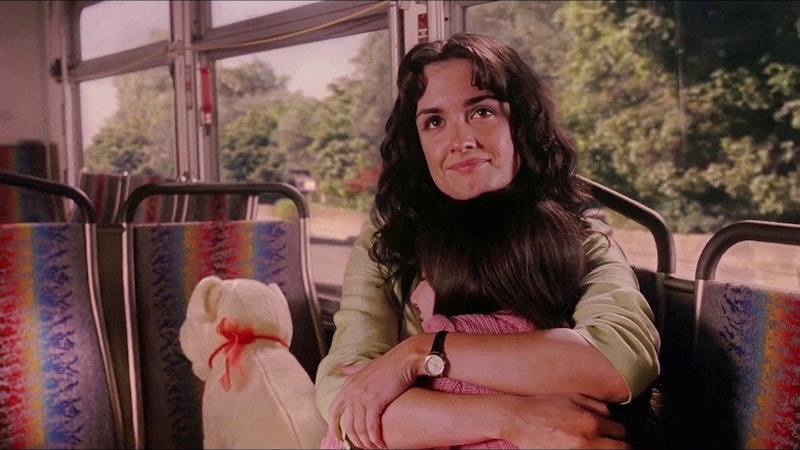In the last nine months, I’ve been watching, and in many cases revisiting, every major American studio release of the first decade of the 21st century. It’s encouraging how much I remember from films I hadn’t seen in two decades—Rat Race, Josie and the Pussycats, Evolution—and it’s confirmation that my radar hasn’t changed much. If I liked a movie then, and if I loved it, I remember how much and why. Jokes, major scenes, plot points, specific shots arrive familiar, as if I’d seen them yesterday. I’ve written a lot about movies I saw in theaters then, and how simpatico I remain with my initial assessments, but this time, I’ll admit I was too young for a movie.
Keep in mind, there’s nothing in James L. Brooks’ Spanglish that a 12-year-old boy can’t figure out: star cook (Adam Sandler) and his busybody wife (Teá Leoni) are neurotic messes, her more so, and their Mexican maid (Paz Vega) is forced to mediate their bullshit and all of the awkward and hilarious moments of cultural clash inherit to any rich Californian family hiring a live-in maid who doesn’t speak English. At the time, I was expecting more Sandler, but it’s really Vega and Leoni’s movie. Brooks cast Sandler on the strength of his career performance in Punch-Drunk Love, and if Spanglish hadn’t bombed in December 2004, perhaps there would’ve been more dramatic roles for him besides Reign Over Me and Funny People.
Looking at it now, I’m sure I found it frustrating how much the movie focuses on Vega and her daughter, and because I have zero memory of Leoni’s impossibly high strung Type-A mother, I must’ve blocked it out; I saw Spanglish with my mom and brother, and we were all let down. Spanglish was a Gracie Films production, and although it would take me nearly 20 years to see any of Brooks’ other feature films, I was a Simpsons obsessive, and this was the first James L. Brooks movie to come out in my moviegoing life (As Good as it Gets, released on Christmas 1997, would’ve been a family outing five years later, but not in the year of Lost in Space).
Watching the film now, it’s full of Simpsons-esque jokes, both visually and in the writing: the young female cook promising to “adopt all of your opinions and thoughts as my own” to a triumphant but miserable Sandler (to him, owning a four-star restaurant means the only place you can go is down); the family dog biting Vega in the ass off screen in a crucial emotional moment; and practically everything Leoni does. Jonathan Rosenbaum, a major Brooks supporter, observed that even at his best, Brooks can’t write characters that don’t adhere to television, specifically sitcom, rules: two or three key characteristics to be recycled and riffed upon week after week for all eternity. Rosenbaum and I agree that Brooks has used this to elevate material that sounds false and schmaltzy on paper into some of the greatest moments in American cinema history.
Whittni Wright running into Nick Nolte’s arms, not her sitcom mother’s in I’ll Do Anything.
Debra Winger’s goodbye scene with her two young sons in Terms of Endearment.
Jack Nicholson telling Helen Hunt, “You make me want to be a better man” in As Good as it Gets.
In 2004, I thought Brooks made postcard movies, stuff that plays on a loop on cable that’ll bother no one and interest even fewer. And he does make, to a point, formulaic films full of trite lessons and thinly-characterized people. But at 12, I didn’t appreciate what Sandler goes through in Spanglish: to be so professionally successful and so personally miserable. Keep in mind nothing cataclysmic happens in Spanglish, further confusing the formula: Leoni cheats, Sandler sort of does, Cloris Leachman is hanging out as the grandmother, Vega and her daughter get on. The framing device is Vega’s daughter’s college admissions essay to Princeton, being read “12 years later,” so either right before or after Donald Trump was elected President. She’s getting in.
Spanglish wasn’t the first “hangout movie” I saw, but it was confusing going in and expecting an even more refined, mature, and sanded-down dramatic Sandler movie and getting yet another bizarre collision of tone and emotion from Brooks, who allegedly test-marketed this movie 13 times. Like all of his films, it’s a multi-million dollar production with the appearance and even aesthetics of readymade studio dramas, but if you watch any of Brooks’ films, they’re really bizarre and unique, a body of work that would be a lot harder to pin down if he wasn’t so acclaimed.
At 12, I wasn’t sophisticated enough to see what Brooks was doing, or how good we had it: Spanglish looks amazing, and its cast is sterling. Compared to the work of Nancy Meyers, his closest analogue, Brooks is a wild man, a totally free director expressing himself fully at the top of his art form.
—Follow Nicky Smith on Twitter: @nickyotissmith

